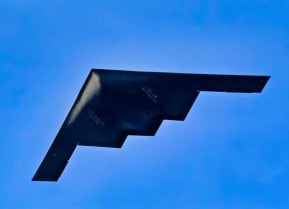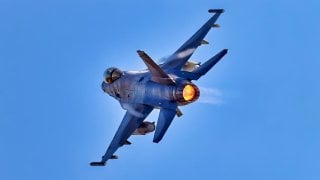The F-16 Block 70 Is Truly the Ultimate 'Fighting Falcon' Fighter
Lockheed Martin has announced the completion of five F-16 Block 70 jets for Bahrain, with an additional 11 in production. This move highlights Bahrain's pioneering role in integrating the F-16 Block 70 variant, enhancing its air force capabilities. The Block 70 features advanced radar, avionics, extended service life, and safety systems like the Auto GCAS, emphasizing its combat-proven performance
Summary: Lockheed Martin has announced the completion of five F-16 Block 70 jets for Bahrain, with an additional 11 in production. This move highlights Bahrain's pioneering role in integrating the F-16 Block 70 variant, enhancing its air force capabilities. The Block 70 features advanced radar, avionics, extended service life, and safety systems like the Auto GCAS, emphasizing its combat-proven performance. Lockheed Martin also reports a backlog of 133 F-16 Block 70/72 jets, with potential for up to 300 additional sales worldwide. The F-16 remains a highly demanded multi-role fighter, showcasing over 400,000 combat hours since its 1979 service introduction.
F-16 Block 70: A New Chapter in Global Air Defense Capabilities
Aerospace giant Lockheed Martin announced on Wednesday that it has completed the production of five F-16 Block 70 jets for Bahrain, while an additional 11 aircraft are in various stages of production and testing. The company recently saw the departure of the first ferry cell of three F-16 Block 70 jets from Greenville, South Carolina, for the Middle Eastern nation. The event highlighted Bahrain's role as the first Gulf Cooperation Council member to operate the F-16 and now the first to integrate the F-16 Block 70 variant into its fleet.
The initial highly upgraded F-16 Fighting Falcons are now performing flight test missions at Edwards Air Force Base (AFB), California, with the 416th Flight Test Squadron.
With the introduction of the F-16 Block 70, we are witnessing a significant leap in fighter capabilities. The integration of this proven platform will allow the Royal Bahraini Air Force to safeguard its skies effectively and partner with allies worldwide," said OJ Sanchez, vice president and general manager of the Integrated Fighter Group at Lockheed Martin.
He further emphasized the importance of the F-16 in the joint 21st Century Security battlespace.
"More than 3,100 F-16s are operational in 25 countries, demonstrating the F-16's reputation as a highly reliable and versatile fighter," Sanchez added while he also acknowledged the enduring partnership between the U.S. government, Bahrain, and Lockheed Martin, a relationship that reflects shared values in defense, economic growth, and cultural ties.
This week's announcement from Lockheed Martin follows another from the company last week that NATO ally and partner the Slovak Republic will acquire the Block 70 variant of the combat-proven F-16 Fighting Falcon. The first two aircraft have completed production, and include a single-seat C-model and a two-seat D-model. Additional Fighting Falcons are slated for completion by 2025, with the first group of aircraft anticipated to arrive in the Central European nation by the middle of this year.
The F-16 Block 70 – An In-Demand Fighter
The F-16 Block 70 jets are a significantly upgraded version of the decades-old Fighting Falcon. The aircraft are equipped with the Northrop Grumman APG-83 AESA Radar, advanced avionics, an extended structural service life of 12,000 hours, and critical safety features like the Automatic Ground Collision Avoidance System (Auto GCAS). Since its integration into the U.S. Air Force in late 2014, the Auto GCAS has been instrumental in saving 13 pilots across 12 F-16 incidents, exemplifying the aircraft's unparalleled safety and performance standards.
The Fighting Falcon is no longer being acquired by the U.S. Air Force, but Lockheed Martin continues to build the F-16 for foreign customers around the world – and it remains the world's most successful, combat-proven multi-role jet fighter ever produced, with more than 4,600 aircraft built since production was approved in 1976.
Despite the fighter having made its first flight more than 50 years ago – and seeing decades of service – it is now one of the world's most in-demand multirole combat aircraft. Lockheed Martin currently has a backlog of 133 F-16 Block 70/72 jets to be produced in Greenville, with seven total jets delivered to date for international partners. This year, Lockheed Martin anticipates 19-21 jets will be delivered from the company's production line in Greenville, leveraging 1LMX advanced manufacturing and digital technologies. Lockheed Martin foresees potential opportunities for up to 300 additional jets worldwide.
The F-16 entered service in 1979, and since that time, it has engaged in more than 400,000 combat hours and has more than a combined 19 million flight hours. Moreover, the Fighting Falcon has been adapted to complete several missions, including air-to-air fighting, ground attack, and electronic warfare. As a combat fighter, it has proven to be highly maneuverable while its combat radius exceeds that of its potential threats.
Author Experience and Expertise: Peter Suciu
Peter Suciu is a Michigan-based writer. He has contributed to more than four dozen magazines, newspapers, and websites with over 3,200 published pieces over a twenty-year career in journalism. He regularly writes about military hardware, firearms history, cybersecurity, politics, and international affairs. Peter is also a Contributing Writer for Forbes and Clearance Jobs. You can follow him on Twitter: @PeterSuciu. You can email the author: [email protected].
Image Credit: Shutterstock.


